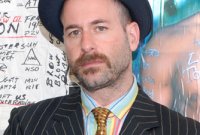
September 04, 2016
 Source/University of Pennsylvania
Source/University of Pennsylvania
Kenneth Goldsmith, professor of English at the University of Pennsylvania.
The University of Pennsylvania, Philadelphia's Ivy League emerald, is typically considered an international powerhouse in medical, business and legal education, to name just a few of its top-flight program areas.
It's also the best place to go if you want to learn about the art of being a wastoid online — without feeling bad about it.
Ken Goldsmith, a distinguished poet and professor of English, will reprise his famed "Wasting Time on the Internet" course for the Fall 2016 Semester, according to The Daily Pennsylvanian.
The class, inspired by the radical legacy of the Situationist movement, debuted in 2014 after Goldsmith announced his experimental intentions in a piece for The New Yorker. For three hours a week, fifteen students met in a Wi-Fi connected room on condition that all of their communication take place online: chat rooms, bots, social media and listservs. Otherwise, they were absolutely free to roam.
Nothing is off limits: if it is on the Internet, it is fair play. Students watching three hours of porn can use it as the basis for compelling erotica; they can troll nefarious right-wing sites, scraping hate-filled language for spy thrillers; they can render celebrity Twitter feeds into epic Dadaist poetry; they can recast Facebook feeds as novellas; or they can simply hand in their browser history at the end of a session and present it as a memoir.
You may be thinking, "Yeah, that's kind of what I did in college, anyway," but Goldsmith is pursuing a larger argument about the evolution of literature and the effects of its antecedents on digital mass culture.
Despite a treasure trove of "found" artistic dross littered across the web, writers have been somewhat reluctant to embrace the Internet's power as a resource for novelty in creative expression. Among aspiring college students and overwhelmed post-baccalaureates, there's a stifling tendency to obey the canon, mirroring its pages but ignoring its inspirational synchrony through time. Others scoff at the played out limits of metafiction, or go too far off the "ingroup" deep end.
Generally, for those who are deeply dedicated to writing, this is all just bravado, apprehension (the usual fear of failure) and hunger for publishability interfering with the use of a rich mixture of source material. Goldsmith's course is about embracing the wilderness online and all that it reveals about our instant inclinations — deliberate, random and semi-conscious.
The idea for this class arose from my frustration with reading endless indictments of the Web for making us dumber. I’ve been feeling just the opposite. We’re reading and writing more than we have in a generation, but we are reading and writing differently—skimming, parsing, grazing, bookmarking, forwarding, retweeting, reblogging, and spamming language—in ways that aren’t yet recognized as literary.
Several of Goldsmith's former "Wasting Time" students defended the course — which has no syllabus — in their interviews with The Daily Pennsylvanian. While "stupid" at times, they felt any fuss about the cost of their credits was missing the point about the value of experiencing a structure of unfettered immersion, if you can call it that.
“It’s something really socially not acceptable, but we were not interested in what is and is not acceptable,” junior Zoe Stoller said.
A few analysts on Fox News were appalled when they learned of the course, calling it "insane" and (no, really?) "a complete waste of time."
Fox News (finally) discovers "Wasting Time on the Internet": http://t.co/UA8b8W9t9e
— Kenneth Goldsmith (@kg_ubu) October 31, 2014
As for Goldsmith, who published a book about the first go-round, it's opened up a new window on the subjects of critical (or post-critical or—wait, where'd that Stanford Encyclopedia of Philosophy browser tab go?) and creative investigation.
"I learned more from this group than they ever would have learned from me, that’s for sure," Goldsmith said.
Commence round two.